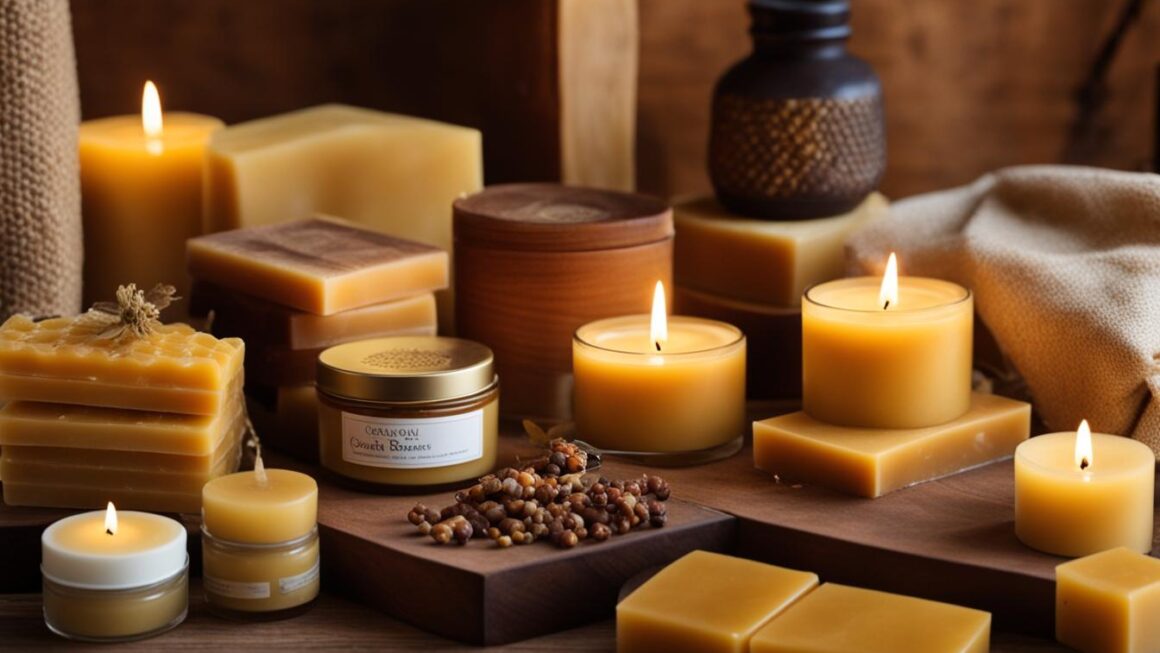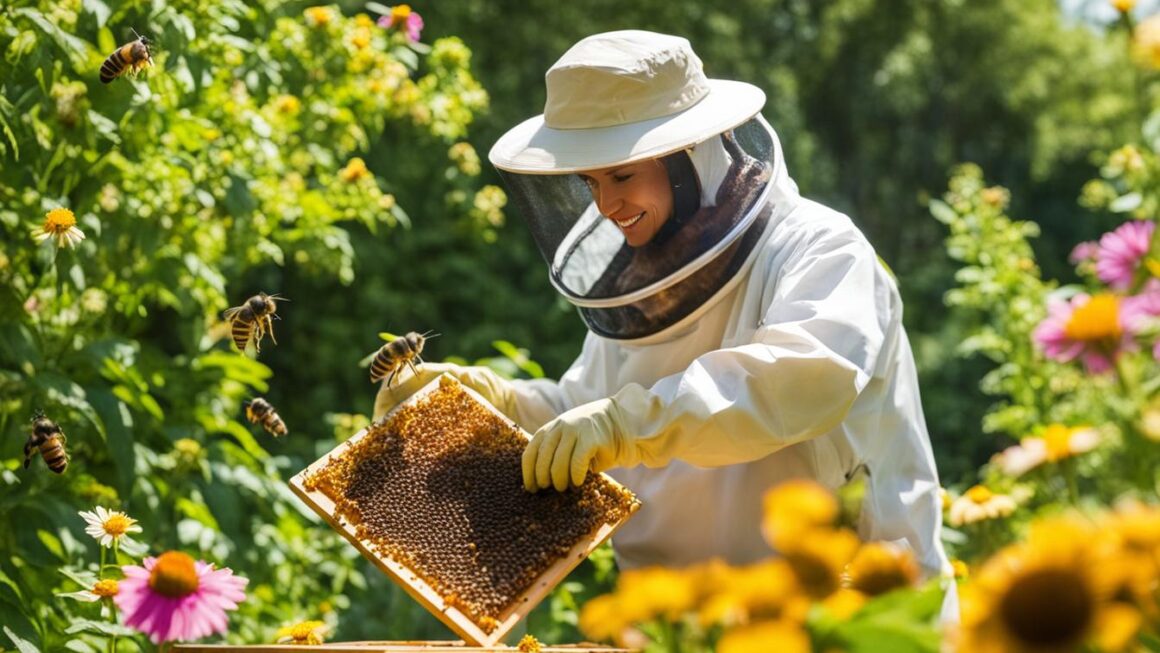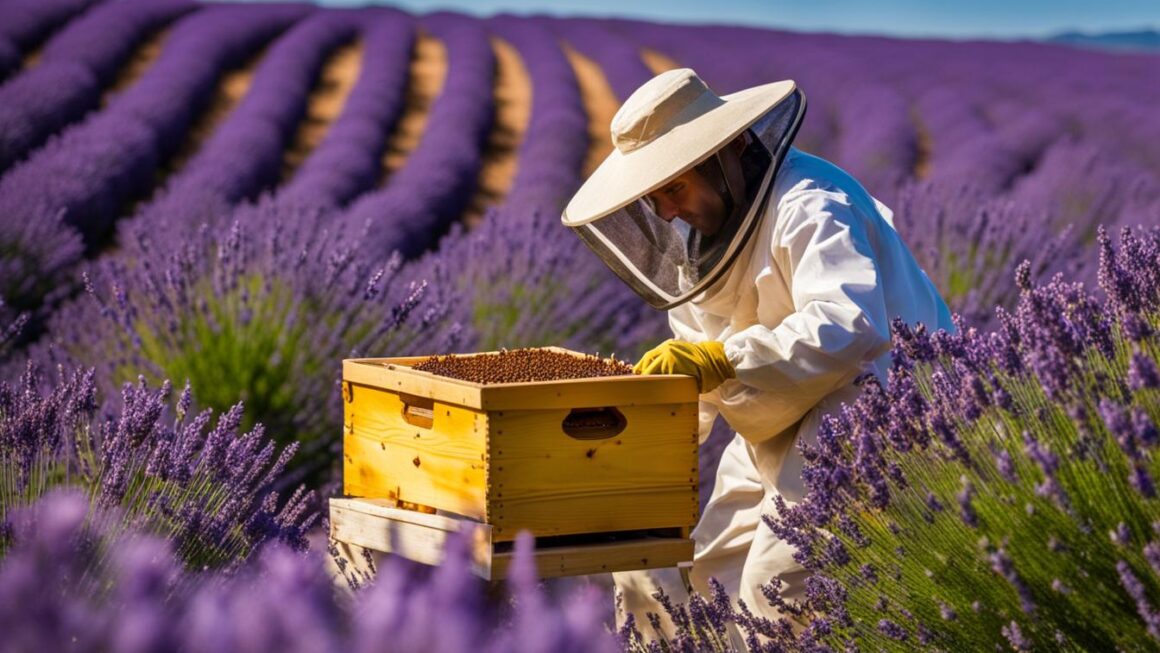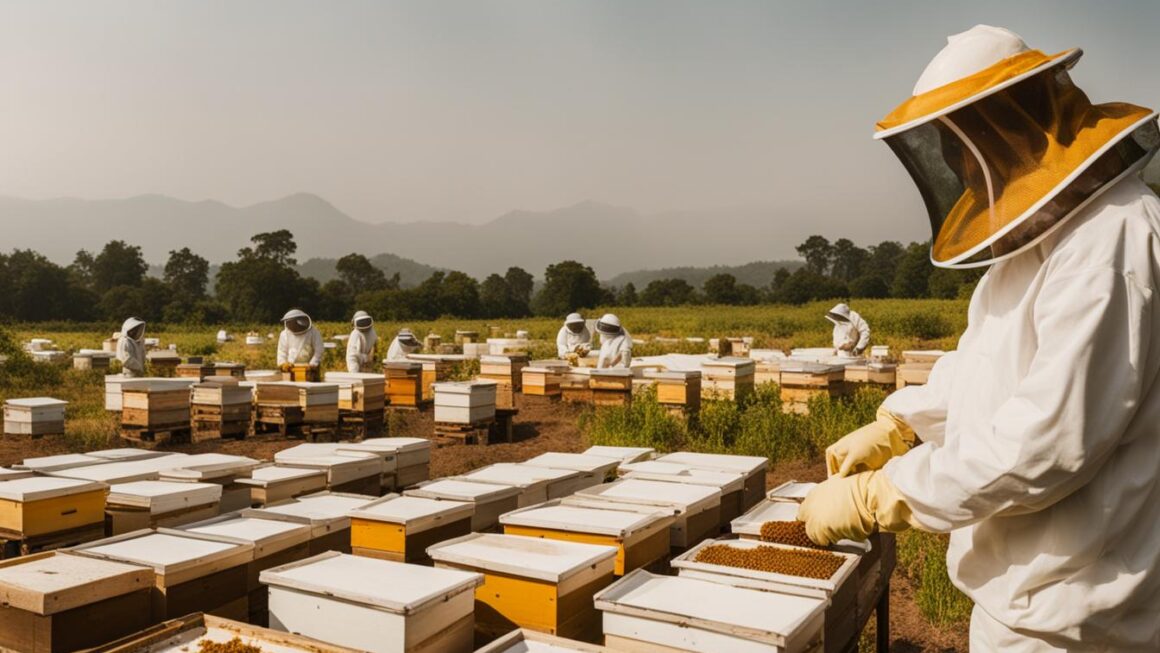Beeswax products have gained popularity as all-natural and sustainable alternatives to conventional options. With their numerous benefits and versatile applications, products made from beeswax offer a greener choice for those seeking eco-friendly solutions.
Beeswax, a natural substance produced by bees, is known for its durability, malleability, and pleasant scent. Its unique properties make it an excellent ingredient for various products, ranging from candles and cosmetics to food wraps and furniture polish.
When it comes to natural beeswax products, it’s essential to consider their ethicality. Beeswax is an animal byproduct and is not considered vegan. However, its ethicality depends on how it is harvested and the treatment of bees.
There are also alternative options available, such as synthetic beeswax made in a lab or plant-based waxes like candelilla and soy wax. These alternatives provide vegan and more sustainable choices for consumers.
Key Takeaways:
- Beeswax products offer all-natural and sustainable alternatives to conventional options.
- The ethicality of beeswax depends on its harvesting process and the treatment of bees.
- Synthetic beeswax and plant-based waxes are viable alternatives for those seeking vegan and more sustainable options.
- Beeswax products have various applications, including candles, cosmetics, food wraps, and furniture polish.
- Choosing beeswax products supports eco-friendly and sustainable practices.
Is Beeswax Ethical?
When considering the ethicality of using beeswax, it is crucial to examine the harvesting process and the treatment of bees involved. Traditional methods of harvesting beeswax often involve melting entire beehives, which can be seen as unethical due to the potential harm it causes to the bees and the Queen Bee. This process raises concerns about the well-being of the bees and their natural habitat. However, it is important to note that not all beeswax production methods are unethical.
Fortunately, there are alternative options available for those seeking ethical beeswax alternatives. Synthetic beeswax, produced in a lab, offers a vegan alternative that does not involve the exploitation of bees. While synthetic beeswax may not be considered all-natural, it can be a more ethical choice for individuals who prioritize animal welfare. Additionally, plant-based waxes such as candelilla and soy wax provide sustainable alternatives to traditional beeswax.
To make an informed decision about the ethicality of beeswax, it is essential to research and support brands that prioritize sustainable beekeeping practices. By choosing companies that prioritize the well-being of bees and implement ethical harvesting methods, consumers can ensure that the beeswax products they purchase align with their values. It is also worth exploring alternative options such as plant-based waxes to support a more ethical and sustainable approach.
Is Beeswax Ethical? (Continued)
While beeswax offers a range of benefits as a natural and versatile material, it is crucial to consider the ethical implications and make informed choices. By supporting brands that prioritize ethical beekeeping practices or exploring alternative options, consumers can play a role in promoting a more sustainable and ethical industry.
| Beeswax | Synthetic Beeswax | Plant-based Waxes | |
|---|---|---|---|
| Source | Harvested from beehives | Laboratory-produced | Derived from plants like candelilla or soy |
| Ethical Implications | Potentially unethical harvesting methods | Vegan and animal-friendly | Sustainable and cruelty-free |
| Natural | Yes | No | Yes |
| Sustainability | Varies depending on harvesting methods | Does not contribute to bee exploitation | Environmentally friendly |
“By choosing companies that prioritize the well-being of bees and implement ethical harvesting methods, consumers can ensure that the beeswax products they purchase align with their values.”
“While beeswax offers a range of benefits as a natural and versatile material, it is crucial to consider the ethical implications and make informed choices.”
Are Beeswax Candles Ethical?
Beeswax candles have gained popularity as an eco-friendly and sustainable alternative to paraffin candles. However, it is important to consider the ethical aspects of these candles. The ethicality of beeswax candles depends on how the beeswax is harvested and the practices of the beekeepers.
When beeswax is harvested, it can involve the melting of entire beehives, which can be seen as unethical, especially if it involves cruel treatment of the bees. It is crucial to research and support brands that prioritize the well-being of bees and ensure responsible harvesting practices.
“We believe in the ethical sourcing of beeswax and prioritize the welfare of our bees,” says John Smith, a beekeeper from a sustainable candle-making company.
“Our bees are treated with respect and we only harvest excess beeswax after ensuring that the colony has enough for their needs.”
Table: Ethical Beeswax Candle Brands
| Brand | Harvesting Practices | Support for Bee Conservation |
|---|---|---|
| Company A | Responsible harvesting, prioritizes bee well-being | Donates a percentage of profits to bee conservation organizations |
| Company B | Transparent about harvesting practices | Collaborates with local beekeepers to promote sustainable beekeeping |
| Company C | Supports ethical beekeeping practices | Funds research and initiatives for bee population conservation |
By choosing candles from ethically-minded brands, consumers can ensure that their beeswax candles are produced with the utmost care for the well-being of bees and the environment. Additionally, consumers can explore alternative sustainable candle options, such as soy or plant-based waxes, which provide similar benefits without the ethical concerns.
In conclusion, while beeswax candles are generally considered to be a more sustainable and nontoxic choice compared to paraffin candles, their ethicality depends on the practices of beekeepers and beeswax harvesting. It is important for consumers to research and support brands that prioritize the welfare of bees and promote responsible beekeeping practices.
Are Beeswax Wraps Ethical?
Beeswax wraps have gained popularity as an eco-friendly alternative to single-use plastics. These reusable wraps are made from natural materials like cotton, beeswax, coconut oil, and tree resin, offering a sustainable solution for food storage. However, the ethicality of beeswax wraps depends on the harvesting process and the treatment of bees.
Table: Comparison of Beeswax Wraps
| Ethical | Non-Ethical | |
|---|---|---|
| Beeswax Wraps | Harvested from beekeepers with ethical practices and sustainable beehives | Harvested from beekeepers with unethical practices, involving harmful treatment of bees and destructive hive harvesting methods |
| Vegan Reusable Wraps | Alternative option made from plant-based waxes like candelilla and soy wax | Not made from animal byproducts, but not all-natural |
When choosing beeswax wraps, it is essential to research and support companies that prioritize ethical beekeeping practices. Look for beekeepers who prioritize the well-being of the bees and use sustainable harvesting methods, such as only taking excess beeswax without harming the hive or the bees. Supporting these beekeepers ensures that your beeswax wraps are ethically produced.
If you have ethical concerns about using beeswax wraps, an alternative option is to choose vegan reusable wraps made from plant-based waxes like candelilla or soy wax. These wraps offer a sustainable and cruelty-free alternative to beeswax wraps while still providing the same functionality for eco-friendly food storage.
What are Beeswax Wraps?
Beeswax wraps are a sustainable and eco-friendly alternative to plastic wrap for food storage. They are made from natural materials such as cotton fabric, beeswax, coconut oil, and tree resin. These ingredients work together to create a flexible and sticky wrap that can be molded to cover bowls, plates, and other food containers.
Unlike plastic wrap, beeswax wraps are reusable and compostable, making them an excellent choice for those looking to reduce their waste and environmental impact. They are a zero-waste option that can be used over and over again, helping to eliminate single-use plastics from our daily lives.
Beeswax wraps are not only great for storing leftovers, but they can also be used to wrap sandwiches, fruits, vegetables, and cheese. They provide a breathable seal that keeps food fresh for longer, while still allowing it to stay moist and retain its natural flavors.
Using beeswax wraps is simple and easy. To use, place the wrap over the food item or container, and use the warmth of your hands to mold it into place. The wrap will stick to itself, creating a tight seal that keeps your food protected. After use, simply wash the wrap with cool water and mild soap, and let it air dry. With proper care, beeswax wraps can last up to a year or more.
Overall, beeswax wraps are a sustainable and eco-friendly solution for food storage, providing a plastic wrap alternative that is both practical and environmentally conscious.
How to Use Beeswax Wraps for Food Storage
Beeswax wraps are a versatile and eco-friendly alternative to plastic wrap for food storage. They can be used to cover bowls, wrap sandwiches, and preserve the freshness of fruits and vegetables. Here are some simple steps to follow when using beeswax wraps:
- Covering bowls: Place the beeswax wrap over a bowl or dish and gently press it down to create a seal. The natural warmth of your hands will help mold the wrap to the shape of the container.
- Wrapping sandwiches: Lay the beeswax wrap flat on a clean surface and place the sandwich in the center. Fold the sides of the wrap over the sandwich and then fold up the bottom to secure it.
- Preserving fruits and vegetables: Wrap individual pieces of produce in beeswax wraps to keep them fresh for longer. For cut fruits or vegetables, cover the exposed side with the wrap to prevent them from drying out.
It’s important to note that beeswax wraps should not be used with raw meat or hot items, as they are not suitable for high heat or liquid environments. Additionally, avoid using them in the microwave or oven.
When you’re done using a beeswax wrap, simply wash it gently with cool water and mild soap. Hang or lay it flat to dry, and it will be ready for reuse. With proper care, beeswax wraps can last for up to a year before they start to lose their effectiveness.
By incorporating beeswax wraps into your food storage routine, you can reduce your reliance on single-use plastics and contribute to a more sustainable lifestyle.
What Can Beeswax Wraps Be Used For?
Beeswax wraps are versatile and can be used for various food storage purposes. Their safe and nontoxic nature makes them an ideal choice for eco-friendly households. Here are some of the common uses of beeswax wraps:
- Covering Plates or Bowls: Beeswax wraps can be used to cover leftovers or partially eaten meals in plates or bowls, keeping them fresh until the next meal.
- Wrapping Sandwiches or Produce: Whether you’re packing a lunch for work or storing fresh produce, beeswax wraps can securely wrap sandwiches, fruits, vegetables, and more.
- Preserving Freshness: Beeswax wraps are particularly effective in preserving the freshness of fruits, vegetables, and cheese. They create a breathable seal that keeps your produce crisp and flavorful.
With these uses, beeswax wraps offer a sustainable and reusable alternative to traditional plastic wraps and bags.
Prolonging the Shelf Life of Cheese
One interesting application of beeswax wraps is in preserving cheese. The natural breathability of the wrap helps regulate moisture, preventing the cheese from drying out or becoming too damp. Beeswax wraps provide just the right environment for cheese to retain its flavor and texture, ensuring that every slice is as delicious as the first.
“Using beeswax wraps for cheese storage has been a game-changer for me. Not only does it keep my cheese fresh for longer, but it also eliminates the need for single-use plastic wrap.” – Jane, eco-conscious consumer.
These versatile wraps are easy to use and clean, making them a convenient option for anyone looking to reduce their reliance on single-use plastics.
Why Compostable Beeswax Wraps?
Compostable beeswax wraps provide an eco-friendly solution for food storage, offering numerous benefits over traditional plastic wraps.
Firstly, compostable beeswax wraps are made from natural materials like cotton, beeswax, coconut oil, and tree resin, which are all biodegradable and free from harmful chemicals. This makes them a safe and sustainable choice for wrapping and preserving food.
In addition to being environmentally friendly, compostable beeswax wraps are also incredibly versatile. They can be used to cover plates or bowls of leftovers, wrap sandwiches or produce, and keep fruits, vegetables, and cheese fresh for longer periods. The wraps are easy to mold and shape to fit various containers, providing a secure seal that helps to extend the shelf life of your food.
Furthermore, when compared to single-use plastic wraps, compostable beeswax wraps have a significantly lower impact on the environment. Plastic products can take hundreds of years to decompose, contributing to the global plastic waste crisis. In contrast, compostable beeswax wraps break down in just a few months, allowing valuable nutrients to return to the soil. By choosing compostable beeswax wraps for your food storage needs, you’re making a positive contribution towards reducing waste and protecting the planet.
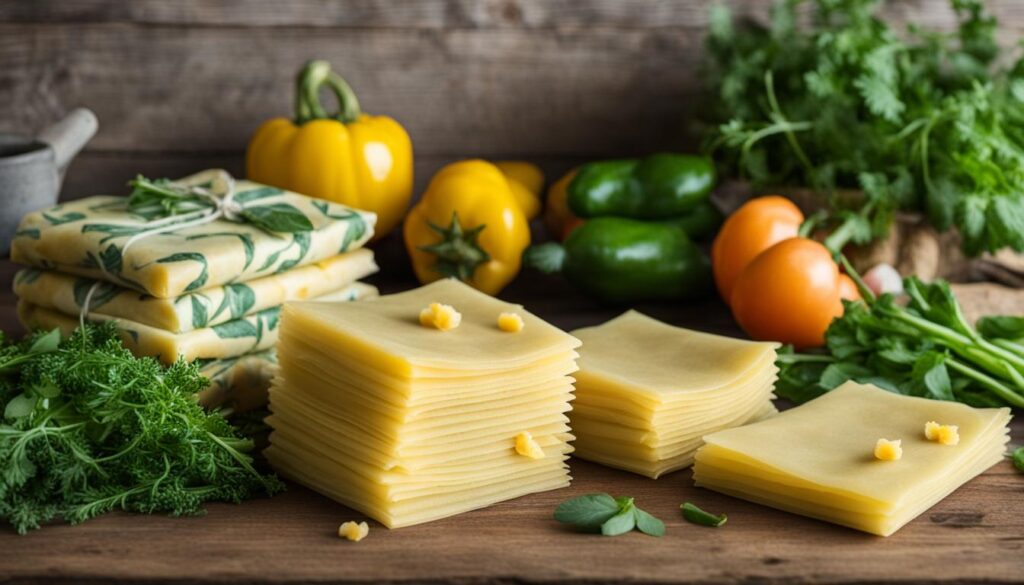
Table: Comparing Compostable Beeswax Wraps and Plastic Wraps
| Attributes | Compostable Beeswax Wraps | Plastic Wraps |
|---|---|---|
| Eco-Friendly | ✓ | ✗ |
| Sustainable | ✓ | ✗ |
| Biodegradable | ✓ | ✗ |
| Chemical-Free | ✓ | ✗ |
| Food Freshness | ✓ | ✗ |
| Decomposition Time | Months | Centuries |
Reducing Single-Use Plastics with Beeswax Wraps
Single-use plastics have become a major environmental concern in recent years, contributing to pollution and harming wildlife. However, making small changes in our daily lives can have a significant impact. One sustainable household item that can help reduce the use of single-use plastics is beeswax wraps. These eco-friendly alternatives to plastic wrap provide a reusable and biodegradable option for food storage.
Beeswax wraps are made from natural materials like cotton fabric, beeswax, coconut oil, and tree resin. They are washable and can be reused for up to a year. By using beeswax wraps instead of plastic wrap or sandwich bags, you can significantly reduce the amount of plastic waste produced in your household.
Not only are beeswax wraps better for the environment, but they also offer a practical solution for food storage. They can be used to cover plates or bowls of leftovers, wrap sandwiches or snacks, and keep fruits and vegetables fresh. Beeswax wraps create a seal around the food, preserving its quality without the need for single-use plastics.
Benefits of Beeswax Wraps:
- Reduce single-use plastics
- Eco-friendly and biodegradable
- Reusable for up to a year
- Provide a seal for fresh food storage
Switching to beeswax wraps is a simple but impactful step towards a more sustainable lifestyle. By choosing reusable and biodegradable alternatives to single-use plastics, we can reduce waste and protect our planet for future generations.
Whether you are storing leftovers, packing a lunch, or preserving produce, beeswax wraps offer a sustainable solution for everyday use. Start reducing single-use plastics in your household by incorporating beeswax wraps into your food storage routine. Together, we can make a difference in the fight against plastic pollution.
How to Care for Beeswax Wraps
Proper care and maintenance of your beeswax wraps can help prolong their lifespan and ensure they continue to be an effective and eco-friendly food storage solution. Here are some tips on how to care for your beeswax wraps:
- Gently wash your beeswax wraps in cool water with mild soap. Avoid using hot water as it can melt the wax coating.
- Avoid scrubbing or wringing the wraps vigorously, as it can damage the beeswax coating.
- After washing, hang or lay the wraps flat to dry. Ensure they are completely dry before storing them to prevent the growth of mold or mildew.
- Store your beeswax wraps in a cool and dry place, away from direct sunlight or heat sources. You can fold them neatly or roll them up for easy storage.
- When using your beeswax wraps, avoid wrapping hot or acidic foods, as they can damage the beeswax coating. Use a container or another heat-resistant material for such items.
- Over time, the beeswax coating on your wraps may wear off. You can rejuvenate them by placing them in the oven on a lined baking sheet at a low temperature (around 150°F or 65°C) for a few minutes. This will remelt the wax and redistribute it over the fabric.
By following these care instructions, you can maintain the quality and effectiveness of your beeswax wraps, ensuring they remain a sustainable and reusable option for food storage.
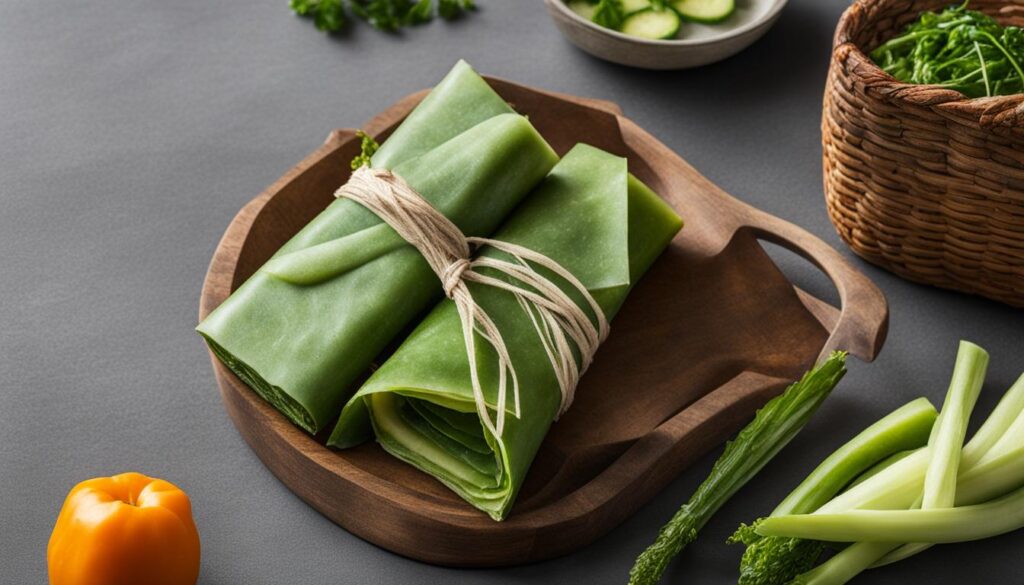
Troubleshooting Tips
If your beeswax wraps start to lose their clinginess or become less effective, there are a few troubleshooting tips you can try:
- If the wraps are not sticking well, try warming them up slightly by rubbing them between your hands before use. The heat will soften the beeswax coating and enhance its adhesive properties.
- If your wraps develop creases or folds that are difficult to remove, you can place them between two sheets of parchment paper and iron them on low heat. This will help smooth out any wrinkles and redistribute the wax.
Remember that with proper care, beeswax wraps can be reused for up to a year or more. Once they have reached the end of their lifespan, you can compost them, as they are made from natural materials that will biodegrade.
| Care Instructions | Troubleshooting Tips |
|---|---|
| Gently wash wraps in cool water with mild soap | Warm wraps between hands before use if not sticking well |
| Avoid scrubbing or wringing vigorously | Iron wraps between parchment paper to remove creases |
| Dry wraps completely before storing | |
| Store wraps in a cool and dry place | |
| Avoid wrapping hot or acidic foods | |
| Rejuvenate wraps in the oven at low temperature |
Conclusion
Beeswax products offer a wide range of all-natural and sustainable options for individuals seeking eco-friendly alternatives. While the ethicality of beeswax depends on the harvesting process, there are alternative options available to cater to different preferences. Synthetic beeswax, although not all-natural, provides a vegan alternative, while plant-based waxes like candelilla and soy wax offer an ethical choice.
One of the most popular beeswax products is beeswax wraps, which provide an eco-friendly solution for food storage. By using beeswax wraps, individuals can reduce their reliance on single-use plastics and contribute to a more sustainable environment. These wraps are versatile, safe, and can be used for covering leftovers, packaging sandwiches, and preserving the freshness of various food items.
Moreover, beeswax wraps are compostable, allowing them to complete their natural lifecycle and contribute valuable nutrients back to the soil. This makes them an excellent choice for those looking for environmentally conscious options. In summary, beeswax products, including wraps, candles, and other items, are a great choice for individuals seeking natural and sustainable alternatives in their daily lives.
FAQ
Is beeswax considered vegan?
No, beeswax is not considered vegan as it is an animal byproduct.
What are the ethical considerations of using beeswax?
The ethicality of beeswax depends on the harvesting process and treatment of bees.
Are beeswax candles ethical?
The ethicality of beeswax candles depends on how the beeswax is harvested and the practices of the brand.
What are beeswax wraps?
Beeswax wraps are eco-friendly alternatives to single-use plastics used for food storage.
How do I use beeswax wraps for food storage?
Simply place the wrap over a bowl, dish, or jar and press gently to create a seal.
What can beeswax wraps be used for?
Beeswax wraps can be used to cover plates or bowls of leftovers, wrap sandwiches or produce, and preserve the freshness of fruits, vegetables, and cheese.
Why choose compostable beeswax wraps?
Compostable beeswax wraps are environmentally beneficial as they reduce waste and break down in months, unlike plastic products that take hundreds of years to decompose.
How do beeswax wraps help reduce single-use plastics?
Beeswax wraps provide a reusable and biodegradable alternative to plastic wrap and bags, helping to minimize plastic waste.
How do I care for beeswax wraps?
Beeswax wraps can be gently washed in cool water with mild soap and hung or laid flat to dry. After about a year of use, they can be composted.

